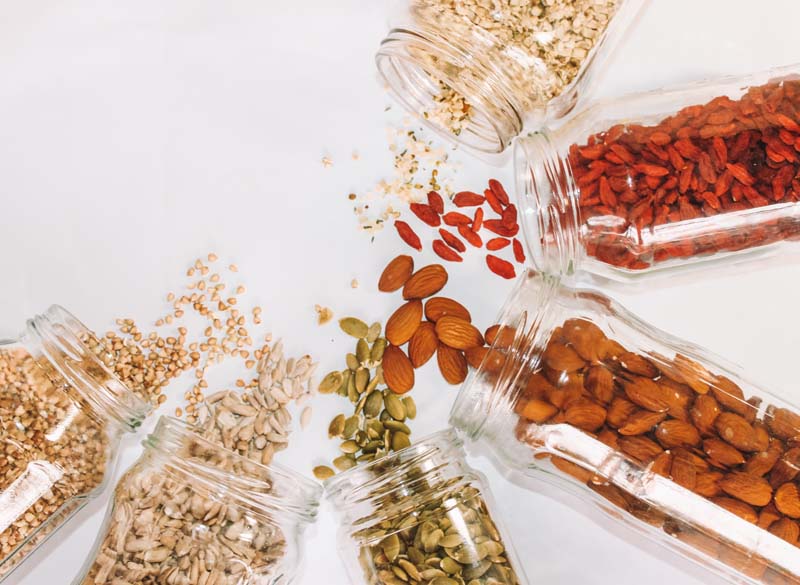Omega-3 oil is good for you
Omega-3 and omega-6 essential fatty acids, which the body cannot synthesise, can be found in fish, as well as seaweed, algae, nuts and seeds. When consuming fish, be careful to get non-farmed or wild varieties of fish which should not be full of hormones, mercury or other things harmful for the body, and will not have been kept in sea pens which can often result in sea lice infestations. Read the label of where your fish was caught/farmed and check it out on google earth. Do research into which ocean areas are heavily polluted. You will become used to reading product labels as a matter of course!
Seaweed and algae are an incredible source of omega-3 (Eicosapentaenoic acid (EPA) and Docosahexaenoic acid (DHA)) if you are looking to eat a Plant Based diet. Fish cannot derive their own omega-3. The reason fish are high in omega-3 is because they eat algae which are the only known plant source of DHA which can be converted to EPA. Seaweed contains preformed EPA making it an incredible source for omega-3 on a Plant Based Diet.
Nuts and seeds can also be a source of the omega-3 Alpha Linolenic acid (ALA) – the body can convert ALA to EPA and DHA but not very efficiently.
Eggs
Eggs are good protein, and the ‘only four a week’ injunction is long since out of fashion.
However we have found a mix of outcomes from research into the benefits of egg in the human diet. We would recommend you always check who has funded the research. It is well known that the outcome of a study can be biased, reflecting the tendency of a scientific study to support the interests of the study’s financial sponsor. We’ve listed some papers for you in the recommended reading at the bottom of the article.
Fresh in preference to tinned
Most important of all tinned foods to avoid are tomatoes. The resin linings of tin cans contain bisphenol-A, a synthetic oestrogen that has been linked to ailments ranging from cancer (particularly of the prostate) to reproductive problems, heart disease, diabetes, and obesity. It is the acidity in tomatoes which causes BPA to leach into your food. Choose tomatoes or passata which come in a glass jar.
Eat Nuts
Nuts are a great source of protein but avoid peanuts even if you aren’t allergic to them. In fact, they aren’t nuts at all, but are what the Americans call groundnuts as they don’t grow on trees but in the ground, as the name suggests, so they are technically legumes. They contain saturated fats and are liable to contamination by aflatoxins which are known to be carcinogenic.

Healthy cholesterol
A healthy cholesterol level is vital to health. Foods which enhance this are those rich in unsaturated fats such as vegetable oils, nuts and seeds, oily fish, oats and barley, soya foods, and fruit and vegetables. The fibre in some food hinders cholesterol from being absorbed from the intestines into the blood stream. Pulses such as beans, peas and lentils are particularly high in this kind of fibre. Avocados contain no cholesterol, while eggs consistently raise HDL (‘good’ cholesterol).
The British Heart Foundation produce a booklet about how to reduce your blood cholesterol – Reducing your blood cholesterol.
Cut down on salt and sugar
We have found that after only a little training, the palate adjusts itself and comes to appreciate more delicate flavours, so that you can gradually cut down on amounts of sugar and salt.
Avoid highly processed food
Try to avoid all highly processed foods, as these contain harmful preservatives and chemicals. That includes packaged cakes, pies and pizzas, sausages, ham, and bacon.
We highly recommend reading The Plant Based Diet Revolution by Dr Alan Desmond in which he details how cutting out processed food can alleviate IBS and Crohn’s Disease symptoms.
Take appropriate supplements
Supplements should be used carefully as they are not a substitute for the right balance of food. They do have their uses though, especially in times of illness, or seasonally, such as vitamin D in winter. The NHS recommends all adults take Vitamin D tablets over the winter. Vitamin B12 supplements are important for vegans and most of the population are probably deficient in it due to the fact we derive it from ingesting bacteria and of course all our veggies and fruit are cleaned to within an inch of their lives before they get to the supermarket shelves.




‘Thank you so much for sending this article to me – I have just read it a second time and looked up more of the references which are all very useful. You must have done an immense amount of work to get it all together. I don’t have any chemistry in my background and have just been reading the article on Cholesterol published in 2019 on line; I did get to the end but need to look up some terminology.
I liked the way you had presented the information – it is all so clear and easy to follow the many, useful links. I shall try and get the booklet on cholesterol which you mention. I loved the illustrations too.’
~ Katherine